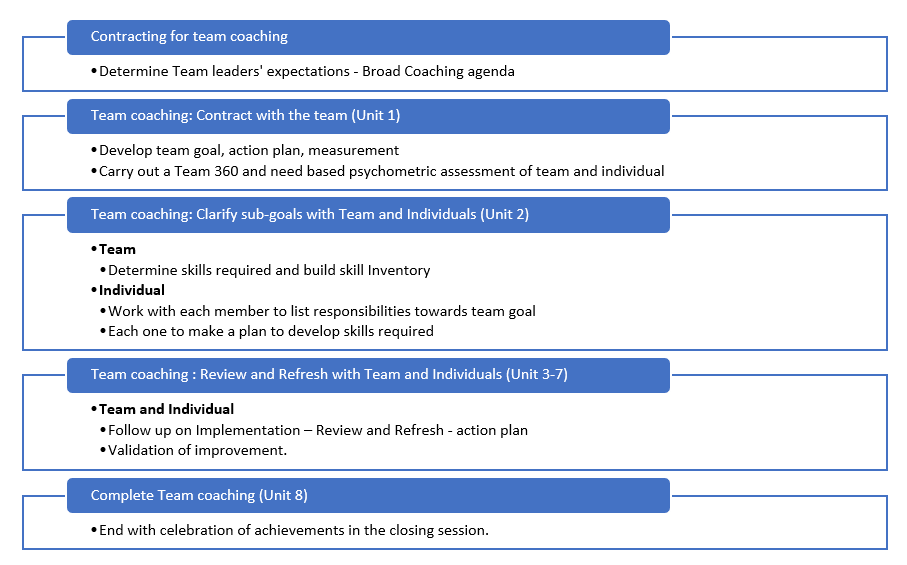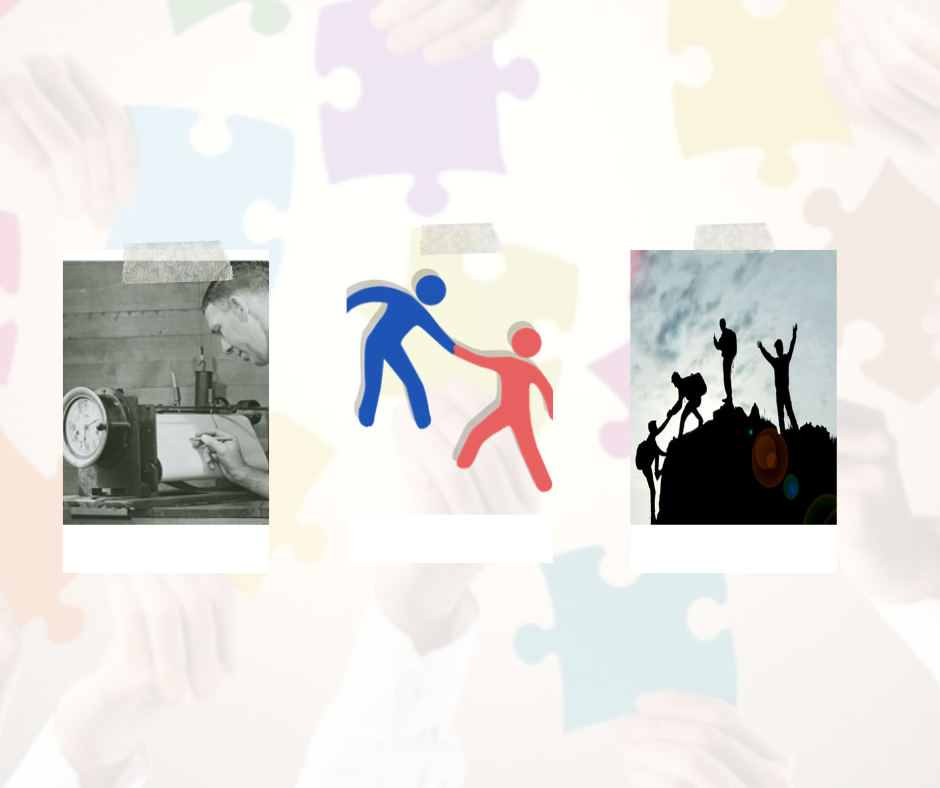An award-winning team coaching framework developed from experience and shared knowledge by Pradip Shroff
Adapted from The Brand Called You[1].
How I got in to coaching and team coaching?
I have been very fortunate.
I had an enriching childhood. Encouraging parents, grandparents, brothers, sisters, friends, teachers and many more family members. I got support from many philanthropists and government of India for my education. My professional career gave me opportunity to gain experience and wisdom. I learnt from my employers, bosses, subordinates, peers, customers, suppliers, and everyone I met. My wife and son have played a vital role in my being what I am.
I am obliged to the community and people all over who have nurtured me.
I was looking for ways and means to return to society, wisdom, knowledge, experience, as part of my retirement planning. Mr R.R. Nair, a well know HR Professional, was on my board at PRS Permacel. He suggested that most satisfying way to share my life lessons will be to become a certified Executive and Business coach. He connected me with CFI (Coaching Foundation India). I liked the rigour and approach of CFI.
In 2010, I certified as a CEO Coach and the numerous executive coaching assignments provided me with opportunities to continue understanding the needs of senior leaders as the business landscape dynamically changes over time. In these coaching exchanges, I helped them in their professional journey whilst appropriately leveraging my vast experience to achieve their goals.
My encounter into team coaching began with one of my early coachee who was a Vertical head of a Global engineering technology company. He felt that exchange of ideas among his subvertical heads were not adequate. He also saw silos, “We are not leveraging their collective strengths” and he wanted this to change. Recognising this gap, he encouraged me to accept the challenge of coaching his team. I was hesitant in the beginning. CFI had not taught me Team coaching yet my coachee had confidence in my ability. “I know you well, you have lot of business experience, you have led so many teams, you understand coaching. You understand my mindset. I want to align them to a common goal. I want them to share their experiences and leverage each other's experiences. The total output of our team should be more than sum of the individual output. I I'm sure you can do team coaching.”
I decided to accept the challenge.
Creating the framework (doing the R&D)
I searched on Google, Amazon and HBR, for books, articles on group coaching, team coaching. I studied several books on winning teams, wisdom of teams, group coaching, team coaching, games for team coaching. I connected learning from all these readings with my own experience of leading several teams. I clarified the different categories for executive coaching.
Executive coaching can be one on one for a leader or for several leaders in a group:
Individual coaching: You work to help individual excel, help individual optimize gains from his or her strengths, help unlock potential. It is like a personal tuition in a simple training program. Coachee gets highest level of attention, confidentiality and customised help from the coach during all stages of coaching journey.
Group coaching: You coach a group of people. Help each one to excel and optimise his/ her own strengths. You use broad questions to help each one and take him/ her through all stages of coaching journey. You follow all steps as in Individual coaching. Each one has an opportunity of learning from peers. Coach will need multi-tasking to provide attention to each one’s progress. Coaching fee per participant will be lower compared to fee for individual coaching.
Team coaching. Team coaching is special niche of group coaching. Team coaching is for executives reporting to one boss, or for executives working on a common project / task. Important attributes for team coaching are 1) all members have a common goal and 2) depend on each other for achieving their goal.
With these categories clear in my mind, I filtered them through the lens of my client’s requirements, and soon developed an approach that I felt comfortable to try it out with my first team coaching assignment. From the start, plain group coaching is not adequate in a business situation. In a group coaching setting, an individual may not share every concern. He/ she may need a private space in a trusted environment: a platform for individual discussion. Hence my team coaching approach is a hybrid of group sessions followed by individual sessions of shorter duration will get best results for a business client.
My Team coaching framework
Every coaching is unique. I hence custom build my approach for each case within this broad framework whereby a complete assignment is for 8 units, one unit every 4-5 weeks with an ideal size of 8 members for team coaching. My one unit of coaching involves one team session of about 3 hours and one individual session of about 1 hour with each team member. Thus, one unit is approximately 12 hours of my coaching time over two consecutive days.
The framework involves nine steps, which I share in the schematic below and I also include the questions used as part of the Team 360:
An Overview of MY Team Coaching Framework
Team 360
I meet each of the team members individually. I use a hybrid approach from appreciative inquiry, strength coaching and storytelling in my conversation with them. For example, I will ask:
Tell me when was this team successful in accomplishing its goal? What made them winner?
What is the best thing this team has done? How was it accomplished?
What are strengths of this team?
What needs to be done to make this team deliver best value to customers?
Rules of thumb
The following rules, or heuristics, has helped me to make this team coaching framework successful.
I have also found that 6 is the least number of members for team coaching. Anything less than that does not create adequate peer learning platform. I have also concluded that 10 is the maximum number of members in a team coaching for me to be effective.
I find that involvement of team leader during some of the team sessions is very useful. This ensures that goals, action plans and implementation are realistic. Typically, I prefer that I have competed coaching the team leader before start of team coaching. At the minimum, I will insist on completing two sessions with the team leader, before starting team coaching. This helps me understand the leader, his approach, his expectations, as also his appreciation of my approach to coaching.
I look at team as one entity, my focus of team coaching will be towards the team. I look at each member as an element, that will perform its own task to participate in team success. My task is to observe behavioural patterns shown by each element (person) during team sessions. Each team session is followed by an individual session. I discuss my observations in the individual session. We jointly develop action plan so that each of them will connect to achieving team goal.
Challenges of team coaching (compared to individual coaching).
Moving from individual coaching to team coaching requires additional skills, competencies and collaborations. I’ve identified my top 3 tips to help peers through the most pertinent team coaching challenges.
1. Actively listen, observe, respond and remember
In individual coaching you actively listen and observe to one person. In a team session, you have to actively listen and observe 8-10 leaders simultaneously. At times, there can be differing views and many leaders wanting talk at the same time. Your brain has to process lot more data to respond during team sessions. Simultaneously concentrate to keep track on specific points that you want to challenge in the individual session.
2. Ensuring every one’s full participation and discipline.
There can be few leaders who tend to dominate a discussion. Some may have their own agenda and want to prove their viewpoints. Some may be poor listeners and may interrupt. Some may be shy and may remain silent. Coach must maintain balance so that everyone gets equal opportunity to express their views.
3. Team discussions may be too “high tech” for the coach
The client business may be high tech and each member of the team will be an expert in his/ her respective area. As a coach it may become difficult to understand when there are heated arguments on some if the issues. In such a situation, I leverage presence of the team leader/ sponsor. You focus on behaviour, approach to presenting viewpoints and let the sponsor comment on technical thoughts.
Awards and accolades
MY clients were very happy with the outcome of the Team coaching program that I developed for them and executed it. The team’s performance was judged best among all verticals of the company on Sales growth and on Employee retention. The head of L&D was awarded for “Best Coaching Program of the year” by an Asian HR Forum in Hong Kong.
End note – my insights and reflection
I am happy that I accepted the challenge given by my client. It gave me opportunity to bundle my experience, knowledge and creativity to help several leaders. Team sessions are very demanding and need lot of energy. When handled well they bring out best of team members and build a winning team. A leap forward in the performance of the team keeps me motivated for accepting newer challenges.
Connect with Pradip Shroff on Linkedin
Pradip is a certified CEO Coach based in Mumbai, India. In last 9 years as CEO Coach, He has completed 55 Senior level Executive coaching assignments. He has done 4 Leadership Team coaching Programs. He has guided 30 Coach Interns of PG program in Executive coaching.
Pradip Shroff brings over 40 years of business experience, with 25 years at CEO level. He brings a strong business acumen and strategic thinking. He is very analytical and innovative in developing solutions. Pradip uses his corporate experience in his coaching assignment. He is a Case author in CFI's book "Are you ready for the corner office”.
Footnote
[1] A vodcast and podcast show that brings you leadership lessons, knowledge, experience and wisdom from hundreds of successful individuals from around the world. For more go to www.tbcy.in













